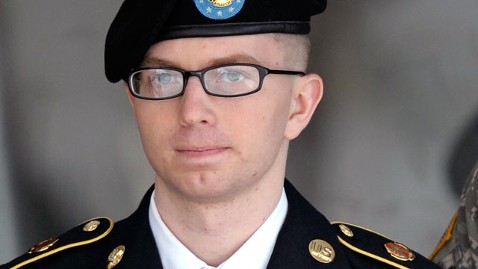Bradley Manning: Judge Denies Dismissal, Sets Trial Date

(Image Credit: Cliff Owen/AP Photo)
The judge overseeing the hearings of the alleged WikiLeaker PFC Bradley Manning today denied a defense request to dismiss all charges with prejudice.
Manning's lawyers had argued that they didn't receive key pieces of evidence from the prosecution and therefore the charges should be dismissed.
At the Ft. Meade, Md., courthouse this morning Col. Denise Lind said that the defense does not have a right for discovery prior to the referral for court martial, which was made in early January; therefore there were no violations by the government in disclosure of information to the defense.
Citing the fact that most of that information requested by defense for discovery is maintained by other government agencies, Lind said the government does not have authority to compel discovery of evidence from other agencies until after the case was referred.
Lind denied the defense motion to obtain grand jury testimony from the Eastern District of Virginia. A grand jury there has been empanelled to investigate the Wikileaks case.
The judge also noted that the prosecution has no authority to release FBI information. She did order the government to go through the material and notify the court of any items that could benefit the defense.
After court on Tuesday the defense and prosecution met with Lind to outline a tentative schedule for the remaining hearings and trial dates.
COURT DATES:
Hearing: June 6-8
Hearing: July 16-20
Hearing: August 27-31
Hearing: September 19-20
Trial: currently scheduled to begin September 21 through October 12, 2012.
The remainder of Wednesday's hearing dealt with arguments on the defense motion to dismiss for unreasonable multiplication of charges.
An Army legal advisor tells ABC News that it's common for a prosecutor to bring charges in two separate forms, knowing one may get dismissed. Lind will examine all charges and may join some together or leave all as is.
The outcome of the decision means a possible lower sentence. The jail time is determined by adding up all the possible sentences for all the crimes. However, Manning is charged with aiding the enemy, which carries a maximum life sentence. The defense has brought a motion to drop this charge as well, arguing Manning didn't have "intent" and therefore was not properly charged by the government.
The government is expected to argue that there doesn't need to be intent to get to charged with aiding the enemy.